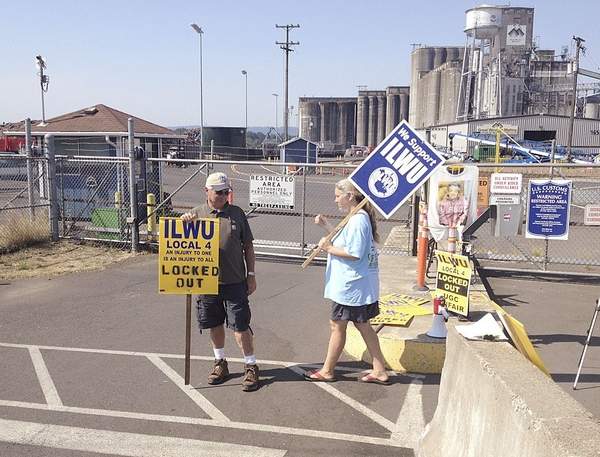forum
library
tutorial
contact

State Comes Up Short
in Grain Inspections
by Editorial Board
Capital Press, October 2, 2014
|
the film forum library tutorial contact |

|
State Comes Up Short
by Editorial Board
|
It appears everyone's interests were considered in the grain terminal
lockout that recently ended -- except those of Washington state farmers.
 Washington State Agriculture Director Bud Hover met last week with the board of the Washington Association of Wheat Growers to explain the state's role in the strike at a key export terminal on the Columbia River.
Washington State Agriculture Director Bud Hover met last week with the board of the Washington Association of Wheat Growers to explain the state's role in the strike at a key export terminal on the Columbia River.
He told them what Gov. Jay Inslee was trying to do when he withdrew state patrol protection for state grain inspectors as the International Longshore Workers Union pickets continued to harass them.
The ILWU was locked out of the United Grain Co. Longview terminal last fall after union members allegedly caused thousands of dollars in damage to the terminal's equipment, Hover told the board. Before that, the union had bullied its way into a contract with another, new export terminal, roughing up security guards and blocking trains.
Once the ILWU set up picket lines at the United Grain terminal, the governor and his associates had to figure out how to get state grain inspectors into the facility to do their jobs. U.S. wheat cannot be exported until it is inspected. They used helicopters and then state patrol escorts to get the inspectors to work as ILWU members threatened them.
That upset the ILWU. According to internal memos obtained by Oregon Public Broadcasting, "the union wants you to pressure the company to go back to the table now or in the alternative stop (Washington State Patrol) escorts, so that it puts pressure on the company to settle," Paulette Avalos, the governor's policy adviser on labor, wrote to Inslee last November.
To his credit, Inslee held out until the summer. Ultimately, though, he turned the grain inspectors and state troopers into pawns. They work for the public, but in this case, the governor rewarded the ILWU for its threats against state employees. He pulled out the state troopers and grain inspectors, in effect forcing the terminal owners to stop shipping wheat or to negotiate with the ILWU.
At the same time, Hover said he was forced to leave farmers in the dark because of the behind-the-scenes maneuvering.
That didn't set well with the farmers.
"It seems like the governor was willing to gamble with all of our livelihoods," Brad Isaak, Grant County wheat growers president, told Hover.
WAWG president Nicole Berg reminded the agriculture director that Washington farmers were not the only ones who were at risk. United Grain Co. handles about 40 percent of the grain exported to Japan, the largest overseas market for U.S. wheat. As harvest approached, farmers across the Upper Midwest and the Pacific Northwest were faced with stockpiling their crop on the ground or scrambling to find other export facilities that could handle it.
The irony of the meeting was that Hover also sought the farmers' support for the state to inspect grain for domestic sales when its agreement with the USDA comes up for renewal.
He said he would be more responsive to Washington farmers "than some guy back east."
Maybe.
learn more on topics covered in the film
see the video
read the script
learn the songs
discussion forum
